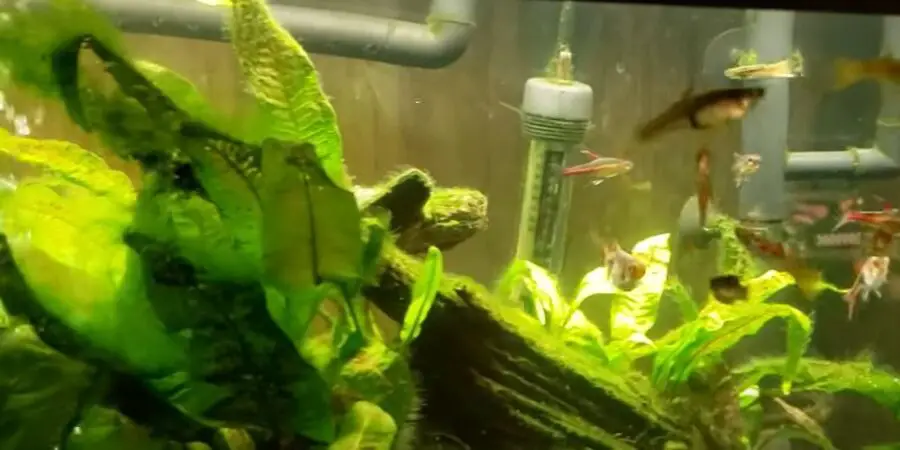Do you have a build up of algae in your tank and worried that your guppies will eat it? Do guppies eat algae?
Will they get sick? Which types of algae are better for guppies to eat?
In this article, we’ll find out about algae varieties and figure out, do guppies eat algae?
Do Guppies Eat Algae?
Yes guppies will eat algae in your aquarium. Algae is a a good food source because it is high protein and is a nutritious meal.
Even guppy fry can eat algae. The algae will do no harm to your guppies.

Is Algae Good For Guppies?
Yes, algae are suitable for guppies consumption. Algae that serve as food will eventually be hindered to the growth of the guppies and live plants.
The LED light around the aquarium, especially in the day, will find it difficult to penetrate into the tanks, especially if algae are on the surface of the water.
Please note, you don’t have to plant algae before they appear. They grow on their own, provided there are nutrients in your water. Guppies feed on them to get nutrients, but algae sap nutrients that should be exclusive to guppies.
Types of Aquarium Algae
Types of algae you will find in your aquarium are:
- Green carpet Algae
- Green water
- Brown Algae
- Red or Beard Algae
Green carpet Algae
This type of algae is the most common; they can occupy the aquarium within a short period if they are not controlled. They don’t only grow on water, you find them on your decorations, rocks, walls of the tank.
Green water
This algae though nutritious for guppies is dangerous because they change the color of the water to the murky green. This condition will reduce the amount of oxygen in the aquarium and prevent lights from getting to the fish.
Brown Algae
This is prominent in a new aquarium with little or no light penetration.
The presence of this algae will create a brown film sheet at the bottom or sides of the aquarium water though you can wipe this brownish film by gently scrubbing the affected part of the aquarium.
Red or Beard Algae
Unlike brown algae that form brown film sheet, red algae form a layered green carpet grass which can be up to 3cm in height.
Guppies have plenty of this algae to eat whenever they are formed, but it saps rich nutrients in the aquarium, and it is difficult to remove if it is allowed to proliferate.

Frequently Asked Questions
1. Do guppies eat aquarium plants?
Yes. Your aquarium plants might get nibbled on by guppies. The reason being is they are omnivorous and depend on some plant matter for their overall balanced nutrition.
Guppies prefer decayed plant matter more than live plants. They can eat algae and dead plants, but are not the best tank cleaners.
2. Do guppies eat biofilm?
Yes. Guppies will take a few bites and try to pick at biofilm. This is a tough substance to get rid of with fish alone. You can employ amazon shrimp and snails to eat biofilm as well.
Be prepared for snails to poop a lot after eating too much biofilm. What I do is use a paper towel and wipe up excess biofilm. I also increase surface agitation in the tank as well.
3. Can Guppies Eat Algae Wafers?
Yes. Keep in mind that algae wafers usually sink and are meant for bottom dwelling fish. This is not a staple food for guppies who like insects, pelleted food and some decayed plant matter.
Guppies will consume bits of algae wafer because they eat live algae as well. Guppies like to eat almost anything offered.

Conclusion
Guppies can be classified as omnivorous, and they eat virtually all fish feed. Wild guppies feed on algae because it is the available food mot times though aquarium guppies also eat algae that grow in their habitat.
Other guppies foods are daphnia, bloodworms, mosquito larvae, shrimp while their fry prefers algae in the nursery stage, baby brine shrimp, crumbled flakes, and the likes.
Algae is a great food to supplement a a guppy diet because it has nutrients, but it grows faster than what guppies can consume, and it eventually does more harm than good.
Table of Contents
